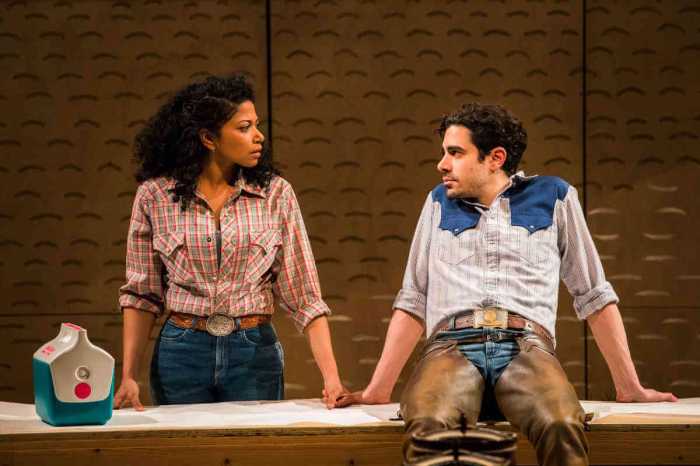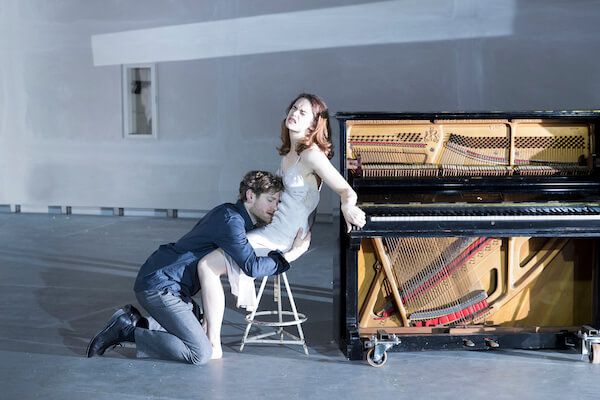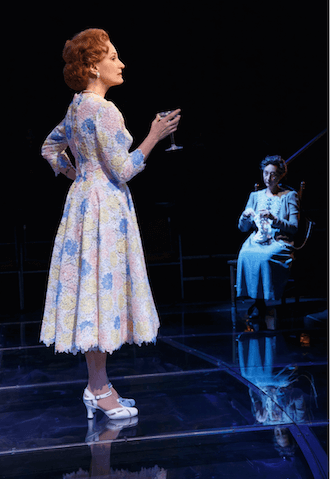Clive Owen and Jin Ha in David Henry Hwang’s “M. Butterfly,” directed by Julie Taymor. | MATTHEW MURPHY
Given that “M. Butterfly” is an operatic-scale tragedy of a romantic, if deluded, passion so intense that it destroys a man’s life, it’s surprising and deeply disappointing that Julie Taymor’s revival is so dull and dreary. Choosing to turn the play into a naturalistic, psychological drama, Taymor misreads the play and makes it bland and incomprehensible. Some works do not lend themselves to deconstruction, and we now have incontrovertible proof that “M. Butterfly” is one of them.
What Taymor seems to have missed in her concept is that much of the play takes place in the mind of Rene Gallimard, a French diplomat in China who becomes obsessed with a Chinese actress and throws himself into an affair with her, never knowing that she is a spy… and male. It is a tale of obsession. Gallimard’s tragedy is that the scale, grandeur, and passion he sees on the stage cannot be replicated in life unless he lives in ever-escalating denial, which is what ultimately destroys him. In Taymor’s mounting, we certainly get a surfeit of gray reality, but Gallimard’s fantasy world is presented in the same drab monochromatic palette. When the fantasy is presented as literal, the distinction between these two planes of experience and the central conflict in the piece are nullified. The production lacks tension and, devoid of theatricality, Gallmiard becomes a hapless fool, which isn’t that interesting.
What’s shocking about this is that Taymor, whose visual inventiveness is legendary, appears to have abandoned all of that when it’s the very thing that could make this production work. Paul Steinberg’s unimaginative set is a series of panels that are constantly being reconfigured to show different locations.
Three plays that never get off the ground
As Gallimard, Clive Owen is simply lost, though the fault for that probably lies most in Taymor’s direction. There is neither lyricism nor passion in Owen’s performance, and we need to see the aching romantic inside the restrained functionary for Gallmiard to make artistic sense. Given Gallimard’s love of opera, and “Madame Butterfly” in particular, playwright David Henry Hwang clearly wants the audience to draw a dark parallel between the suicides of Cio-Cio-San and Gallimard. Their deaths are supposed to be grand and tragic, neither one able to face brutal, unforgiving reality. Yet Owen’s performance is so constrained and unfocused that the parallel is lost.
Jin Ha as Song Liling, Butterfly, is similarly hampered by the production’s concept. He is not really believable as a woman. Perhaps that’s Taymor’s point, but the illusion needs to succeed at least partially so the audience gets an inkling of what Gallimard might have seen. At the end of the play when Song as a man confronts Gallimard, it should be shocking and wrenching. Here it just comes off as a lovers’ spat.
On the page, Gallimard’s epic demise recalls classic tragic figures of opera and literature. On the stage, in this production at least, he comes off as an unexceptional, bi-curious guy who gets in over his head with a trick from Craigslist.
Denise Gough in Duncan Macmillan’s “People, Places & Things,” directed by Jeremy Herrin. | TEDDY WOLFF
Writers love to take on addiction. There are classic movies like “The Days of Wine and Roses,” and, of course, Eugene O’Neill’s “Long Day’s Journey Into Night.” The decline and struggle for redemption of the addict is fertile territory for drama. At least when it’s done well. Unfortunately, that’s not always the case. “People, Places & Things,” now at St. Ann’s Warehouse in Brooklyn, is a prime example of how this form goes wrong.
Unlike O’Neill’s classic, Duncan Macmillan’s play is simplistic, predictable, and overly expository — a clinical enactment of one woman’s bottom and climb back into life. The woman, Emma, is the center of the piece, and the rest of the ensemble mostly floats around her taking on different roles in her recovery, relapse, and recovery again. We see therapy. We see a relapse and crawling back from the abyss. We see a difficult, attempted rapprochement with parents. We’ve seen it all before.
Director Jeremy Herrin’s production does have some expressionistic laser-like lighting and techno music, which is supposed to give us a sense of what’s going on in Emma’s brain as her addiction takes hold of her. It’s romantic and theatrical, and it does break up Emma’s episodes, but not much more.
The one thing this kind of play does offer is the opportunity for some epic scenery chewing, and Denise Gough as Emma doesn’t disappoint. The problem is that her character isn’t well enough developed, so the eruptions of behavior are merely over-the-top and impressive for their emotional pyrotechnics. Without a developed character or relationships, such showmanship serves no purpose other than to show that an actress has the technical ability to flail and scream without shredding her voice and allow herself to look an awful mess. Each scene or section is a set piece, and because it’s so plot-driven, there is no time to get inside the character and understand her journey, so for all the emotional heat, the effect is oddly distant and cold. (Gough gives a much more nuanced and developed performance as Harper in the production of “Angels in America” coming to Broadway. That’s also a much better play and character to start with.)
Addiction is a serious disease, and recovery is painful and never guaranteed. When we watch Mary Tyrone, in O’Neill’s play, we see not just her tragedy but the tragedy of a family poisoned by her disease. “People, Places & Things” — the title taken from a 12-Step axiom warning against triggers that could lead to relapse — lacks that perspective and depth. It is only Emma’s story and, as powerful and horrific as that is, its scope remains small, allowing the audience to keep its distance, untouched and unengaged.
Pico Alexander, Aimee Carrero, Mary Testa, Jason Alexander, and Sherie Rene Scott in John Patrick Shanley’s“The Portuguese Kid,” which the playwright directs. | RICHARD TERMINE
“The Portuguese Kid.” John Patrick Shanley’s new comedy, which he also directed, at Manhattan Theatre Club isn’t very much fun. In fact, it’s terrible. It aspires to be vintage Neil Simon, and it’s vintage all right — as in dated. Haven’t we as a culture moved beyond comedy that portrays women as either bimbos or barracudas? Haven’t we seen enough emasculated men trying to get their own back. Evidently not in Shanley’s world, for that’s the stock-in-trade of this play. And what’s with the gratuitous Trump jokes? They’re nothing more than pandering to the presumed biases of the audience, which would be fine if they were funny. But they’re not.
The tortured plot concerns a lawyer, Barry, who has married a much younger wife, Patty. When Atalanta shows up for Barry to handle the estate of her late husband, we learn they were childhood friends and Atalanta once saved Barry from being mugged by a Portuguese kid. Atalanta has taken up with Freddie, also much younger, who used to be Patty’s boyfriend and left her. You can see where this is going as these mismatched couples go at one another. Also lurking about is Barry’s mother, Mrs. Dragonetti, who serves the dramatic purpose of adding cynical hostility to the proceedings while providing the hackneyed comic device of hearing old people swear. With comedies like this, the audience needs at least one character they can relate to as events become chaotic and excessive, but each one here is so repellent that they can’t get off stage fast enough.
The poor actors caught in this mess are doing the best they can, but Shanley’s direction is sub-par sitcom stuff. There isn’t a bit we haven’t seen before, from a tissue gag to overly spicy canapes. Jason Alexander and Sherie Rene Scott as Barry and Atalanta come off pretty well, given their inherent comic talents. They are much better than the material. Pico Alexander and Aimee Carrero as Freddie and Patty have the thankless job of being undeveloped foils. The best one can say of the wonderful Mary Testa as the nasty Mrs. Dragonetti is that she is fully committed to the part, but she deserves better.
This is the kind of comedy that grew up in the years after World War II and made light of gender roles. During the Vietnam years, comedies like Simon’s played with established social structures even as they were being challenged by the Baby Boomers and changing sensibilities. They were intended as light diversions, reassuring but not to be taken too seriously. Times have changed, and what once was playful is now cringe-inducing and tone-deaf. Seen in that light, “The Portuguese Kid” is a kind of zombie. The best thing to do is shoot it in the head.
BUTTERFLY | Cort Theatre, 138 W. 48th St. | Tue., Thu. at 7 p.m.; Wed. at 7:30 p.m.; Fri.-Sat. at 8 p.m.; Wed., Sat. at 2 p.m.; Sun. at 3 p.m. | $39-$159 at telecharge.com or 212-239-6200 | Two hrs., 20 mins., with intermission
PEOPLE, PLACES & THINGS | St. Ann’s Warehouse, 45 Water St. at Dock St., DUMBO | Through Dec. 3: Tue.-Sun. at 7:30 p.m.; Sat.-Sun. at 2 p.m. | $55-$65 at ovationtix.com or 718-254-8779 | Two hrs., 20 mins., with intermission
THE PORTUGUESE KID | City Center Stage 1, 131 W. 55th St. | Through Dec. 3: Tue.-Wed. at 7 p.m.; Thu.-Sat. at 8 p.m.; Wed., Sat.-Sun. at 2 p.m. | $95-$112.50 at nycitycenter.org or 212-581-1212 | One hr., 40 mins., no intermission






































